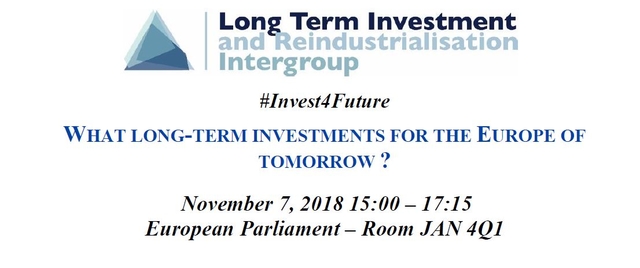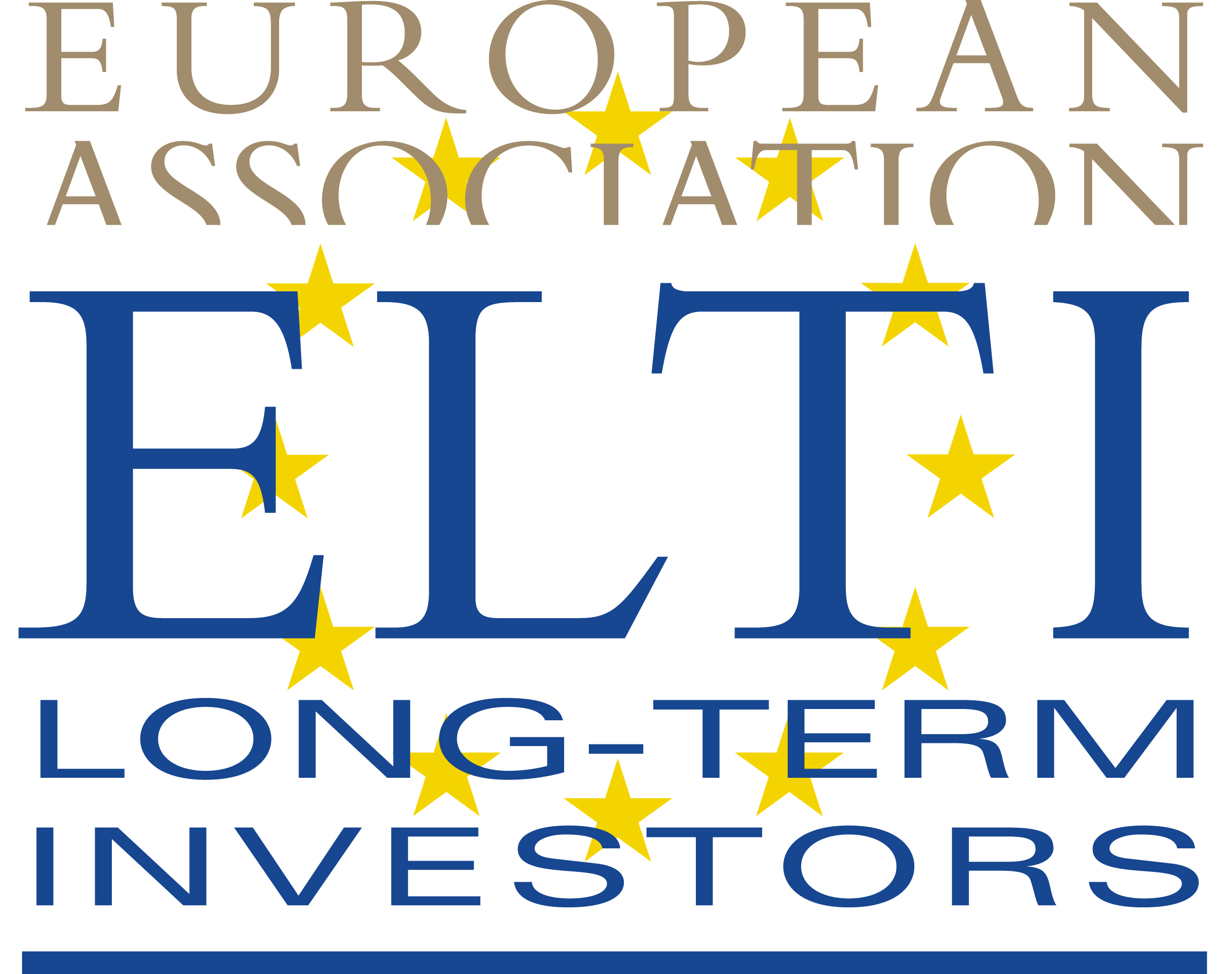Registration
On 7 November 2018, the Long-Term Investment and Reindustrialisation Intergroup is organising a conference specifically dedicated to the issue of long-term investment.
Restoring Competitiveness and Growth Potential in EU:
What Long-Term Investments for the Europe of Tomorrow?
What does the EU urgently need to do to revive Long-Term Investments?
in the presence of Pierre Moscovici, European Commissioner for Economic and Financial Affairs, Taxation and Customs
Agenda
Updated 06.11.2018
This conference will take stock on the achievements regarding the creation of a conducive environment for long-term investments in Europe, from the Green paper on the Long-term financing of the European Economy by former Commissioner Barnier (2013) up to the Capital Markets Union (prudential regulation, accounting standards, governance issues…) and the Action plan on sustainable finance published earlier this year.
This conference will also be the occasion to launch a report on this specific topic, conducted by the task-force of Paris financial center under the supervision of former AXA financial director, Gérard de La Martinière.
Download the Report: Betting on the Long-Term rebuilding investment for the Europe of Tomorrow
Summary
The European Union (EU) is in a paradoxical situation: more than 10 years after the financial crisis, growth has finally returned – year in year out – but investment, and in particular long-term investment, did not regain its pre-crisis level. Yet the challenges facing the EU require an unprecedented long investment effort. And this is even more alarming because structural forces not favorable to long-term investment will undoubtedly continue to exist in the future.
In the aftermath of the crisis, the priority of the reforms has been to strengthen the soundness of the financial system to prevent the emergence of new crises and foster the return of confidence. At European level, this priority given to financial stabilization has been accompanied by a desire to encourage the development of market financing to compensate for an intermediated financing perceived as failing. However, while financial stability is a necessary condition for the recovery of long-term investment, it is not a sufficient condition for this recovery - the continued weakness of the LTI in Europe highlight this.
It quickly became clear that the reforms adopted in the name of stability have tended to favor short-term behavior and penalize long-term investments. In view of this, targeted remedial measures were adopted to correct what were perceived as undesirable effects of these reforms, but these "patches" were ultimately limited in scope.
Our hypothesis is that, in the absence of a specific, coherent and comprehensive approach to long-term investment, the measures taken have only been deficient and limited, sometimes even inadequate. That is why, to avoid falling back on the same pitfalls when formulating our recommendations, we propose a simple, but robust and complete definition of what a long-term investment is by nature.
"Long-term investment is the financial investment strategy deployed by any kind of operator with stable resources that both permit and require asset allocation that is likely to produce an economic return in the future”.
Based on this definition, it seems to us possible to create a favorable regulatory environment by applying some simple principles:
- Principle # 1: Putting ILT at the heart of public policy
- Principle # 2: to allow an adequate measurement of risks and long-term returns
- Principle # 3: to promote long-term asset-liability management
- Principle # 4: to promote an alignment of interests of the various actors on long-term objectives
Introduction
Why are we publishing a long-term investment report in 2018?
Seven years ago now, following the National Conference on Long Term Financing (Assises nationales du financement de long terme), this task force bringing together the participants in long-term financing in France issued its thoughts in an initial report and its conclusions remain still relevant today: long-term investment (LTI) is crucial for dynamic, inclusive and sustainable growth in Europe, and a proactive European policy in all aspects of the issue remains an absolute necessity if we are to reverse persistent economic frailties.
But what has changed over the past seven years is that long-term investment is now a European priority. As a result of the Green Paper on long-term financing of the economy, the launch of the Capital Markets Union project and the adoption of the Juncker plan, it occupies a central position within public policy and is giving rise to numerous initiatives.
Yet it has to be stated that European investment remains sluggish. It has only risen slightly since the crisis and remains below the considerable demands that our society and economy must meet (climate change, digital revolution, demographic and migration issues, upgrading of defence capabilities, developing a knowledge-based society, massive maintenance requirements, renewal and extension of infrastructure, etc.).
This paradox is the starting point for this report: although long-term investment is an issue currently recognised as strategic by political and economic decision makers, and while numerous measures have been taken to support long-term investment in recent years, the LTI deficit is persistent within the EU. How do we explain this paradox and how can the status quo be changed?
This is the question the task force members have sought to answer on the eve of European elections when citizens will be called on to select the Europe of tomorrow.
This report seeks to:
- Assess the long-term investment deficit in Europe based on some simple macroeconomic data;
- Inventorise the measures taken and assess them through the lens of long-term investment;
- Present an analysis of what constitutes LTI and propose an operational definition that derives from this analysis;
- Formulate recommendations – both general in the form of principles and illustrated with concrete examples applied to existing regulations.
Gaining a better understanding of LTI and radically transforming how it is understood by the regulatory authorities: this, in our opinion, is an urgent requirement for the European Union.
About the LTI Task Force of the Paris financial marketplace
Bringing together since 2010 the economic and financial operators of the Paris financial market involved in long-term investment (professional associations, various organisations, companies and think tanks)1, the LTI Task Force led by Gérard de la Martinière2 is an informal body for reflection and discussion which has contributed to the emergence of the LTI issue in France and at the European level.
An initial report produced under Mr de la Martinière was presented at the Assises Nationales du Financement de Long Terme (National Conference on Long Term Financing) held in Paris on 17 November 2011 and published by Documentation Française.
Since then the Task Force has been continuing its work on a regular basis, contributing to public consultations relating to the issue of long-term investment. It has notably worked intensively on the Green Paper of the European Commission on the long-term financing of the European economy, published in 2013.
This forum for reflection and discussion is novel in two respects: the diversity of its participants (financial operators, companies and associations) and the variety of subjects covered ‒ both are testament to the richness of the LTI issue (banking regulation, insurance regulation, infrastructure financing, responsible investment, etc.).
This multi-disciplinary working method enables current LTI issues to be placed against a long-term perspective, and to treat them via a decompartmentalised approach appropriate to the subject matter at hand.









